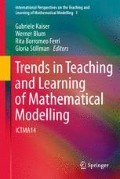Abstract
Using a triangulation of methods by applying a three-step design consisting of observation, stimulated recall and interview, upper secondary students’ handling of real-world contexts was investigated. It was found that a real-world context given in a task is not only interpreted very individually but is also dynamic in a sense that the contextual ideas change and develop during the process of working on the task. Furthermore, data analysis led to four different ideal types of dealing with the real-word context: reality bound, integrating, mathematics bound, ambivalent. Based on the theoretical background of situated learning, these ideal types can be understood as effects of – often implicitly given – sociomathematical norms concerning the permissible amount of extramathematical reasoning when working on a mathematical problem.
This is a summarised version of a PhD-thesis (Busse 2009), intermediate results with different foci were published previously (Busse 2005; Busse and Kaiser 2003).
Access this chapter
Tax calculation will be finalised at checkout
Purchases are for personal use only
References
Boaler, J. (1993). Encouraging the transfer of “School” mathematics to the “Real World” through the integration of process and content, context and culture. Educational Studies in Mathematics, 25, 341–373.
Burkhardt, H. (1981). The real world and mathematics. Glasgow: Blackie.
Busse, A. (2005). Individual ways of dealing with the context of realistic tasks – First steps towards a typology. Zentralblatt für Didaktik der Mathematik, 37(5), 354–360.
Busse, A. (2009). Umgang Jugendlicher mit dem Sachkontext realitätsbezogener Mathematikaufgaben. Ergebnisse einer empirischen Studie. Hildesheim: Franzbecker.
Busse, A., & Borromeo Ferri, R. (2003). Methodological reflections on a three-step-design combining observation, stimulated recall and interview. Zentralblatt für Didaktik der Mathematik, 35(6), 257–264.
Busse, A., & Kaiser, G. (2003). Context in application and modelling – An empirical approach. In Q. Ye, W. Blum, S. K. Houston, & Q. Jiang (Eds.), Mathematical modelling in education and culture: ICTMA 10 (pp. 3–15). Chichester: Horwood.
Denzin, N. K. (1970). The research act. Chicago: Aldine.
Flick, U. (2000). Triangulation in der qualitativen Forschung. In U. Flick et al. (Eds.), Qualitative Forschung (pp. 309–318). Reinbek: Rowohlt.
Lave, J., & Wenger, E. (1991). Situated learning. Legitimate peripheral participation. Cambridge: Cambridge University Press.
Niederdrenk-Felgner, C. (1995). Textaufgaben für Mädchen – Textaufgaben für Jungen? Mathematik Lehren, 68, 54–59.
Silverman, D. (1985). Qualitative methodology and sociology. Aldershot: Gower.
Stern, E., & Lehrndorfer, A. (1992). The role of situational context in solving word problems. Cognitive Development, 7, 259–268.
Stillman, G. (2000). Impact of prior knowledge of task context on approaches to application tasks. The Journal of Mathematical Behavior, 19(3), 333–361.
Stillman, G., Brown, J., & Galbraith, P. (2008). Research into the teaching and learning of applications and modelling in Australasia. In H. Forgasz et al. (Eds.), Research in mathematics education in Australasia 2004–2007 (pp. 141–164). Rotterdam: Sense Publishers.
Strauss, A., & Corbin, J. (1990). Basics of qualitative research: Grounded theory procedures and techniques. Newbury Park: Sage.
Weber, M. (1922/1985). Wissenschaftslehre. Gesammelte Aufsätze. Tübingen: J.C.B. Mohr.
Wiest, L. R. (2002). Aspects of word-problem context that influence children’s problem-solving performance. Focus on Learning Problems in Mathematics, 24(2), 38–52.
Yackel, E., & Cobb, P. (1996). Sociomathematical norms, argumentation, and autonomy in mathematics. Journal for Research in Mathematics Education, 27(4), 458–477.
Author information
Authors and Affiliations
Corresponding author
Editor information
Editors and Affiliations
Rights and permissions
Copyright information
© 2011 Springer Science+Business Media B.V.
About this paper
Cite this paper
Busse, A. (2011). Upper Secondary Students’ Handling of Real-World Contexts. In: Kaiser, G., Blum, W., Borromeo Ferri, R., Stillman, G. (eds) Trends in Teaching and Learning of Mathematical Modelling. International Perspectives on the Teaching and Learning of Mathematical Modelling, vol 1. Springer, Dordrecht. https://doi.org/10.1007/978-94-007-0910-2_5
Download citation
DOI: https://doi.org/10.1007/978-94-007-0910-2_5
Published:
Publisher Name: Springer, Dordrecht
Print ISBN: 978-94-007-0909-6
Online ISBN: 978-94-007-0910-2
eBook Packages: Humanities, Social Sciences and LawEducation (R0)

